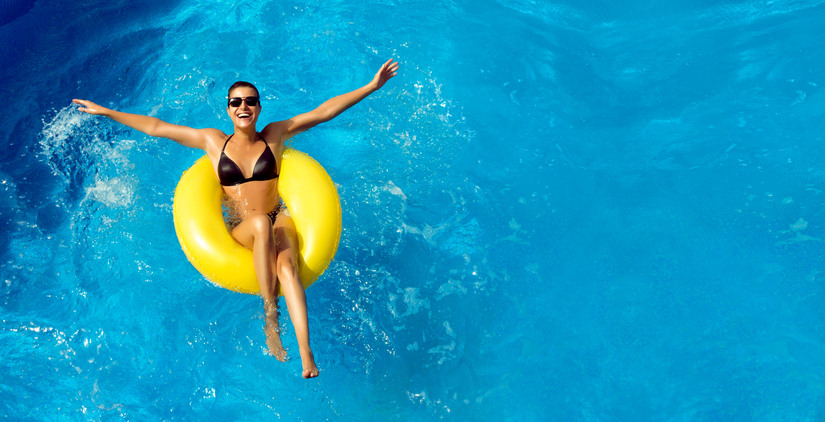
Swimming is an excellent exercise. But did you know chlorinated water can harm your teeth?
Nothing is more refreshing during the hot summer than taking a dip in your local swimming hole or backyard pool. But the chlorine used to protect the water from harmful bacteria could pose a hidden danger to your teeth!
An occasional swim in a chlorinated pool will not damage your teeth. But if you take regular laps, protecting your teeth from the potential harms of chloride is a must. Let’s look at how chlorine affects your teeth and what you can do to keep your teeth healthy while enjoying a swim.
What chlorine may do to your teeth
Swimming pools provide a perfect breeding ground for bacteria because the water is warm and has a neutral or low acidic pH balance. A pH balance refers to how acidic water is, with neutral pH considered 7. With that level, water is balanced between acidic and alkaline. Below seven is considered acidic.
Chlorine is used in public pools, backyard pools, and hot tubs to kill bacteria. Without chlorine, bacteria may grow and cause skin rashes, earaches, diarrhea, and eye pain in swimmers.
The Centers for Disease Control and Prevention recommends a pH between 7.2 and 7.8 in treated water to prevent bacteria and germs from growing. But even at these safe levels, prolonged exposure to chlorine may injure your teeth. Among the conditions that could develop are:
Swimmer’s Calculus. When the pH in the water rises, the protein in saliva breaks down, leaving your teeth vulnerable to staining. Swimmer’s calculus is more often seen in regular swimmers. A study from Spain found competitive swimmers had a higher incidence of teeth discoloration than occasional swimmers.
Enamel Erosion. Enamel is the first layer of protective coating on your teeth. But if you swim frequently, your enamel may erode due to chlorine exposure. Although chlorine does not directly cause tooth decay, the weakened enamel makes your teeth more susceptible to cavities and chipping.
Tooth Sensitivity. Another side effect of weakened enamel is tooth sensitivity. If you spend too much time in chlorinated water, you may notice that your teeth hurt when you drink hot or cold liquids.
Dry Mouth. Chlorine decreases saliva production, and without saliva, your mouth will feel dry.
Protect yourself from chlorine
You don’t have to give up your daily swims. Swimming is a great aerobic activity that strengthens your heart and muscles. But you can take these precautions to protect your teeth from any possible chlorine damage.
Close your mouth. You may not realize it, but you could be swimming with an open mouth. Make sure to close your mouth when taking laps, so you don’t take in any chlorine.
Rinse after swimming. After a pool session, rinse your mouth with water or fluoride mouthwash. This will increase the amount of saliva in your mouth and return the pH level in your mouth back to neutral. Brushing immediately after a swim isn’t recommended. A high acid level in the water may soften your teeth and make them vulnerable to damage by brushing. S
Know the chlorine level in your pool. Ask the operator of your public pool about the chlorine level. If you have a home pool, get a professional to check the pH and chlorine levels. You can also purchase a pool pH strip at a local recreational supply store.
Alert your dentist to any changes in your teeth. Discolorations and/or sensitivity could be due to chlorine exposure. Treatment can reverse the damage.
Take a break from the pool to take care of your teeth
Schedule an appointment at Espire’s Fort Collins location today! Our highly trained dentists can check your teeth for any damage or decay and provide helpful tips to enjoy summertime swims without harming your teeth. Don’t live near our Fort Collins, Colorado, office? Find one of our other locations near you.
Fort Collins
2117 Custer Drive
Fort Collins, CO 80525


